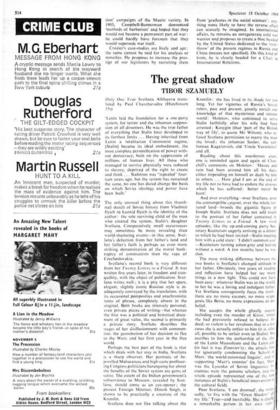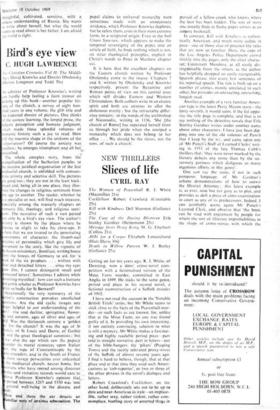The great shadow
TIBOR SZAMUELY
Only One Year Svetlana Alliluyeva trans- lated by Paul Chavchavadze (Hutchinson 35s)
`Lenin laid the foundation for a one-party system, for terror and the inhuman suppres- sion of all dissenters. He was the true father of everything that Stalin later developed to its furthest limits ... Having inherited from Lenin a totalitarian Communist regime, [Stalin] became its ideal embodiment, the most complete personification of power with- out democracy, built on the suppression of millions of human lives. All those who managed to survive physically were reduced to slavery, deprived of the right to create and think ... Stalinism was "repealed" four- teen years ago, but the system has remained the same, no one has dared change the basis on which Soviet ideology and power have been built.'
The only unusual thing about this thumb- nail sketch of Soviet history from Vladimir Ilyich to Leonid Ilyich is the identity of the author : the sole surviving child of the man who created the system, Stalin's daughter Svetlana. Comparatively small occurrences may sometimes be more revealing than world-shattering events—in this sense, Svet- lana's defection from her father's land and her father's faith is perhaps an even more striking demonstration of the moral bank- ruptcy of communism than the rape of Czechoslovakia.
Svetlana's second book is very different from her Twenty Letters to a Friend. It was written five years later, in freedom and tran- quillity, with the object of publication. Svet- lana writes well ; it is a pity that her spare, elegant, slightly ironic Russian style is in- adequately conveyed by the translation, with its occasional pomposities and anachronistic turns of phrase, completely absent in the original. Both books are intensely personal, even private pieces of writing—but whereas the first was a political and historical docu- ment of great value, the second is primarily a private story. Svetlana describes the stages of her disillusionment with commun- ism; the germination of her decision to flee to the West: and her first year in the free world.
Perhaps the best part of the book is that which deals with her stay in India. Svetlana is a sharp observer. Her portraits of be- jewelled Maharanees and high-caste profiteer- ing Congress politicians haranguing her about the benefits of the Soviet system are gems of satire. The extent of the Indian government's subservience to Moscow, revealed by Svet- lana, should come as an eye-opener ; the present Foreign Minister, Dinesh Singh, is shown to be practically a creature of the Kremlin.
Svetlana does not like talking about the
Kremlin : she has lived in its shade for too long. Yet her vignettes of Russia's Soviet rulers, past and present, greatly enrich our knowledge of that mysterious and sinister world: Molotov, who continued to serve Stalin faithfully after his wife had been arrested ; Kosygin (that `part of the British way of life', to quote Mr Wilson), who re- fused Svetlana permission to marry the man she loved ; the inhuman Suslov, the sub- human Kaganovich, old 'Uncle Voroshilov' and all.
Reading about this murderous crew, one is reminded again and again of Chur- chill's comments on Molotov : 'Havoc and ruin had been around him all his days. either impending on himself or dealt by him to others ... How glad I am at the end of my life not to have had to endure the stresses which he has suffered : better never be born'.
And over everything—over Svetlana, over the contemptible epigoni, over the whole tor- tured land—broods the gigantic figure of Joseph Stalin. Svetlana does not add much to the portrait of her father contained in Twenty Letters to a Friend. A few vivid episodes, like the up-and-coming party Sec- retary Kuznetsov eagerly arriving at a dinner to which he had been invited—Stalin meeting him with a cold stare: 'I didn't summon you' —Kuznetsov turning ashen-grey and leaving without a word. A few months later he was shot.
The most striking difference between the two books is Svetlana's changed attitude to her father. Obviously, two years of reading and reflection have helped her see many things in a new light. This could not have been easy : whatever Stalin was to the world. to her he was a loving and indulgent father. Yet Svetlana courageously faces the truth: there are no more excuses, no more scape- goats like Beria, no more expressions of dis- belief.
She accepts the whole ghastly record. including even the murder of Kirov, which she had previously refused to believe. In- deed, so violent is her revulsion that in a few cases she is actually unfair to him (it is, after all, possible to be unfair even to Stalin). She ascribes to him the authorship of the idea of the Lenin Mausoleum and the Lenin cult (in fact it was Zinoviev's) ; she attacks him for ignorantly condemning the School- el Marr, 'the world-renowned linguist'. and 01 supporting `Marr's enemies' (in fact. Mar was the Lysenko of Soviet linguistics. hr• enemies were the genuine scholars, and III. whole episode represented one of the rare instances of Stalin's beneficial intervention the cultural field).
Poor Svetlana. 'I am doomed', she writes sadly, `to live with the "Great Shadow- all my life.' True—and inevitable. She is clearly a remarkable person in her own right: thoughtful, cultivated, sensitive, with a unique understanding of Russia. She wants to write about herself, but what the world wants to read about is her father. I am afraid the world is right.



































 Previous page
Previous page